“I WANTED TO PRESERVE THE AMERICAN DREAM FOR MY CHILDREN AND GENERATIONS TO COME.”
Alabama’s Katie Boyd Britt discusses why she ran for the Senate

“I WANTED TO PRESERVE THE AMERICAN DREAM FOR MY CHILDREN AND GENERATIONS TO COME.”
Alabama’s Katie Boyd Britt discusses why she ran for the Senate
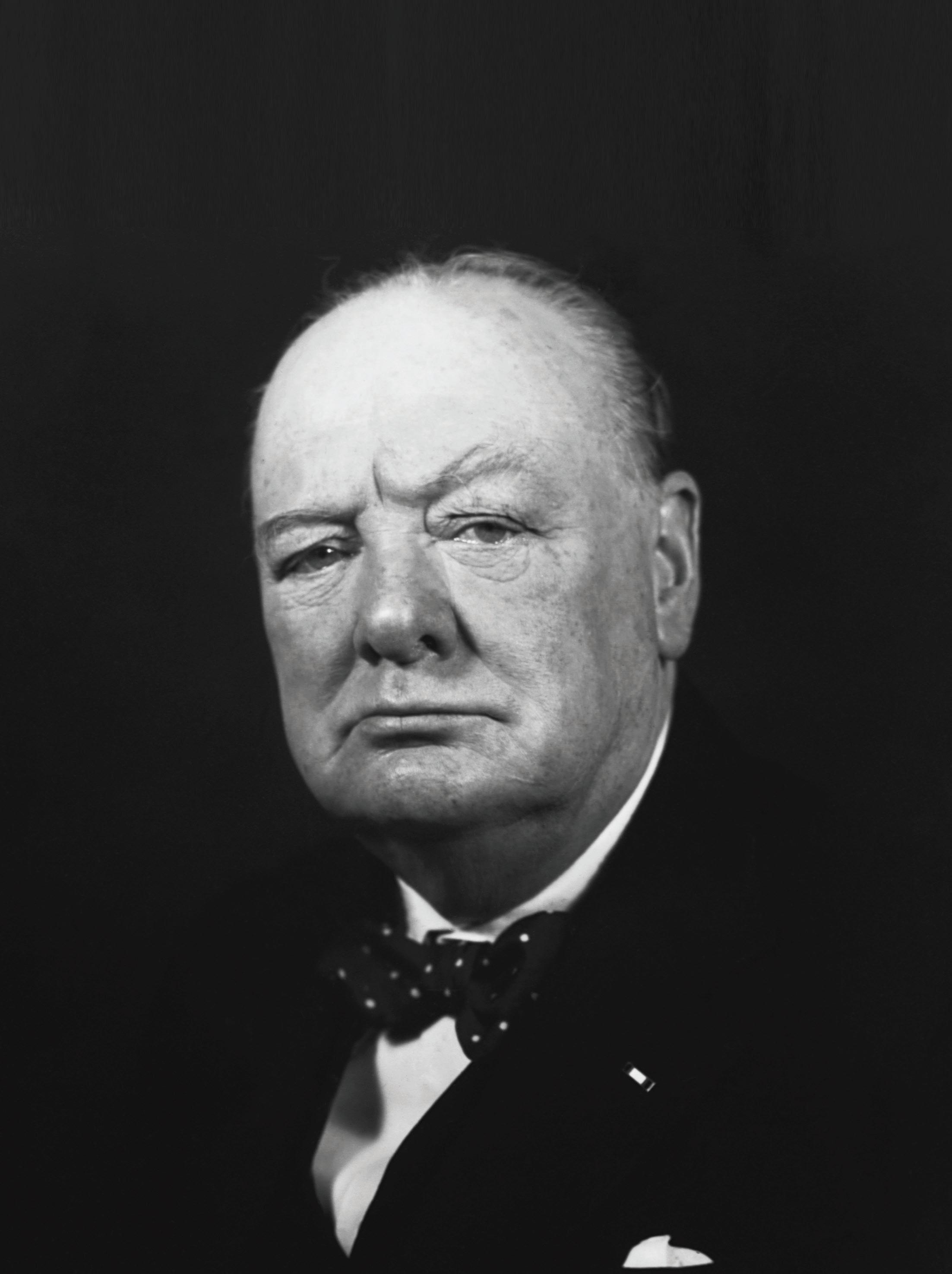 by Tim Oliver & Garvan Walshe
by Tim Oliver & Garvan Walshe
the Phrase

Plus – Britain after Brexit: Mugged by Economic Reality - by Adam Posen
And – The U.S., the UK, and the Politics of Ukraine - by David Landsman
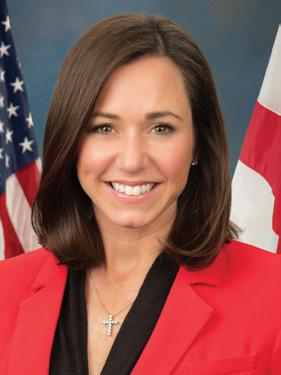

4 THE SPECIAL RELATIONSHIP
Why It Still Matters 77 Years after Churchill
Coined the Phrase
By Tim Oliver & Garvan WalsheThe bond between the United States and the United Kingdom was forged during World War II. With Russia on the march and China on the rise, it will be more important than ever in the years ahead.
6 Britain after Brexit: Mugged by Economic Reality
By Adam S. PosenMost economic trends post-Brexit have come out pretty much as the mainstream economists expected, including losses of around 4% of GDP versus pre-Brexit trend growth.
8 Two Trade Moves to Strengthen the Special Relationship
By Tori K. SmithThe New Atlantic Charter and the Atlantic Declaration seek to strengthen the U.S.-UK economic relationship, but without bold action these initiatives will not materially change the status quo.
10 The U.S., the UK, and the Politics of Ukraine
By David LandsmanThe war in Ukraine has reaffirmed the salience of the Special Relationship. But the gap between the U.S. commitment and the UK’s is also highly significant.
12 Dawn of the Not So Golden Era of UK-China Relations
By Matt BrazilGiven Xi Jinping’s lifetime tenure and his apparently careful study of Mao Zedong’s rise, a difficult period lies ahead, with the pendulum of China’s tick-tock relations with Britain stuck at a cold extreme.
Cover Story(cont’d)
14 Proving the Benefits of AUKUS
By Lisa CurtisThe landmark agreement between Australia, the UK, and the U.S. to provide Australia with nuclear-powered submarines shows America’s committment to deter Chinese aggression.
16 A Brief History of the Special Relationship
By Danielle Wagner & Fynn HaagenFrom Churchill visiting FDR over Christmas of 1941 to Biden’s visit with Sunak this summer, an examination of key moments that made the U.S.-UK partnership what it is today.
Debate: Should Ukraine Be Allowed to Join NATO?
20 Yes, Ukraine is Fighting for its Freedom — and Ours
By Daniel FriedUkraine’s argument is essentially that because Russia has never attacked a NATO country, peace for Europe requires Ukraine’s NATO accession. It’s a strong argument.
21 No, The Alliance is Supposed to Enhance, not Sacrifice, U.S. Security
By Doug BandowThe promise to go to war should be reserved for the most important interests — ones that are vital, even existential. Ukraine is not one.
Editor Lou ZickarAmerica boasts the world’s leading 5G networks, covering more than 320 million Americans and counting. These networks are an economic engine, enabling new services, companies, and applications and transforming industries such as healthcare, energy, transportation, logistics, and education. The resulting 5G Economy will create 4.5 million new jobs and generate $1.5 trillion in economic growth during this decade, according to Boston Consulting Group.
CTIA is proud to support the Ripon Society.

U.S. Senators:
Shelley Moore Capito – Senate Co-Chair
Todd Young – Senate Co-Chair
Marsha Blackburn
Bill Cassidy, M.D.
Susan M. Collins
Steve Daines
Joni Ernst
Deb Fischer
John Hoeven
Jerry Moran
Mike Rounds
Thom Tillis
Roger Wicker
U.S. Representatives:
Larry Bucshon, M.D. – House Co-Chair
Frank Lucas – House Co-Chair
Mike Kelly – Vice Chair
Dan Newhouse – Vice Chair
Ann Wagner – Vice Chair
Mark Amodei
Kelly Armstrong
Don Bacon
Troy Balderson
Andy Barr
Stephanie Bice
Mike Bost
Vern Buchanan
Michael C. Burgess, M.D.
Ken Calvert
Mike Carey
Buddy Carter
Tom Cole
John Curtis
Tom Emmer
Ron Estes
Brian Fitzpatrick
Randy Feenstra
Andrew Garbarino
Kay Granger
Garret Graves
Sam Graves
French Hill
Bill Huizenga
Bill Johnson
Dusty Johnson
Dave Joyce
John Joyce, M.D.
Young Kim
Darin LaHood
Bob Latta
Julia Letlow
Nancy Mace
Brian Mast
Kevin McCarthy
Michael McCaul
Carol Miller
John Moolenaar
Blake Moore
Jay Obernolte
August Pfluger
Guy Reschenthaler
Cathy McMorris Rodgers
Steve Scalise
Adrian Smith
Lloyd Smucker
Pete Stauber
Bryan Steil
Glenn “GT” Thompson
Mike Turner
David Valadao
Brad Wenstrup, D.P.M.
Steve Womack
In a summer that saw Britain’s Prime Minister visit the White House and America’s President visit 10 Downing Street just over one month later, the latest edition of The Ripon Forum examines the Special Relationship between the United States and the United Kingdom and its renewed importance in an increasingly volatile world.
Leading our coverage are two astute observers of the UK political scene. Tim Oliver is Director of Studies for the Institute for Diplomacy and International Governance at Loughborough University in London, while Garvan Walshe heads up communications for the European Policy Centre in Brussels and is a former policy advisor to the British Conservative Party. In our lead essay, the pair examine why the Special Relationship still matters 77 years after Winston Churchill coined the phrase. They also lay out “six highly unlikely things” that would have to happen for the partnership between both countries to end.
In another essay, Adam Posen, the President of the Peterson Institute for International Economics, takes an in-depth look at the impact that Brexit has had on the UK economy. Posen — who was honored by Queen Elizabeth II in 2014 for his services to British economic policy — finds that leaving the European Union has not proven to be the economic boon that Brexit’s supporters had pledged it would be. Tori Smith of the American Action Forum examines another aspect of U.S.-UK economic policy — trade — and finds that while rhetoric by the leaders of both nations to strengthen trade relations has been positive, real progress will not occur without some bold moves, which she lays out, as well.
At a time when the war in Ukraine has galvanized the Western alliance, veteran British diplomat David Landsman examines the politics of the issue, the levels of military commitment, and whether public support is likely to continue if the conflict persists. In other essays focusing on another global challenge, Matt Brazil of the Jamestown Foundation writes about the “Dawn of the Not So Golden Era of UKChina Relations,” and Lisa Curtis of the Center for a New American Security assesses the new military alliance between the U.S., UK, and Australia.
Ripon Society fellows Danielle Wagner and Fynn Haagen provide a “Brief History of The Special Relationship,” while former U.S. Ambassador to Poland Daniel Fried and the Cato Institute’s Doug Bandow square off in a debate over whether Ukraine should be allowed to join NATO. And in our latest Ripon Profile, first-term Senator Katie Boyd Britt of Alabama discusses her new job on Capitol Hill and what Republicans should do to reclaim their majority in the Senate next year.
As always, we hope you enjoy this latest edition of The Ripon Forum, and encourage you to contact us with any questions or comments you may have.
Lou Zickar, Editor louzickar@riponsociety.orgMark Strand’s call to bring back the role of the conference committee in Congress (“Bring Back Conference Committees,” Ripon Forum, June 2023) is an important part of the overall need to restore the authorization process. The exercise of the traditional congressional power to control Federal spending was a two-step authorization followed by appropriation. In those two steps, policy was set before money was spent. The conference committees assured that there was agreement between the House and the Senate on what those policies should be and how many dollars allocated.
By assigning virtually all fiscal decisions to one committee, Appropriations, and then waiving the House rule permitting authorization committees to protect their jurisdiction, the body abandoned a key element of fiscal discipline which the Constitution sought to enforce. Unless the Congress reasserts its most important obligation – consensus decisions about spending – we become little better than an oligarchy run by the President and a handful of congressional leaders. Mark Strand has put his finger on a major step towards decentralizing power on Capitol Hill.
Bob WalkerU.S. Representative (PA-16), 1977-1997
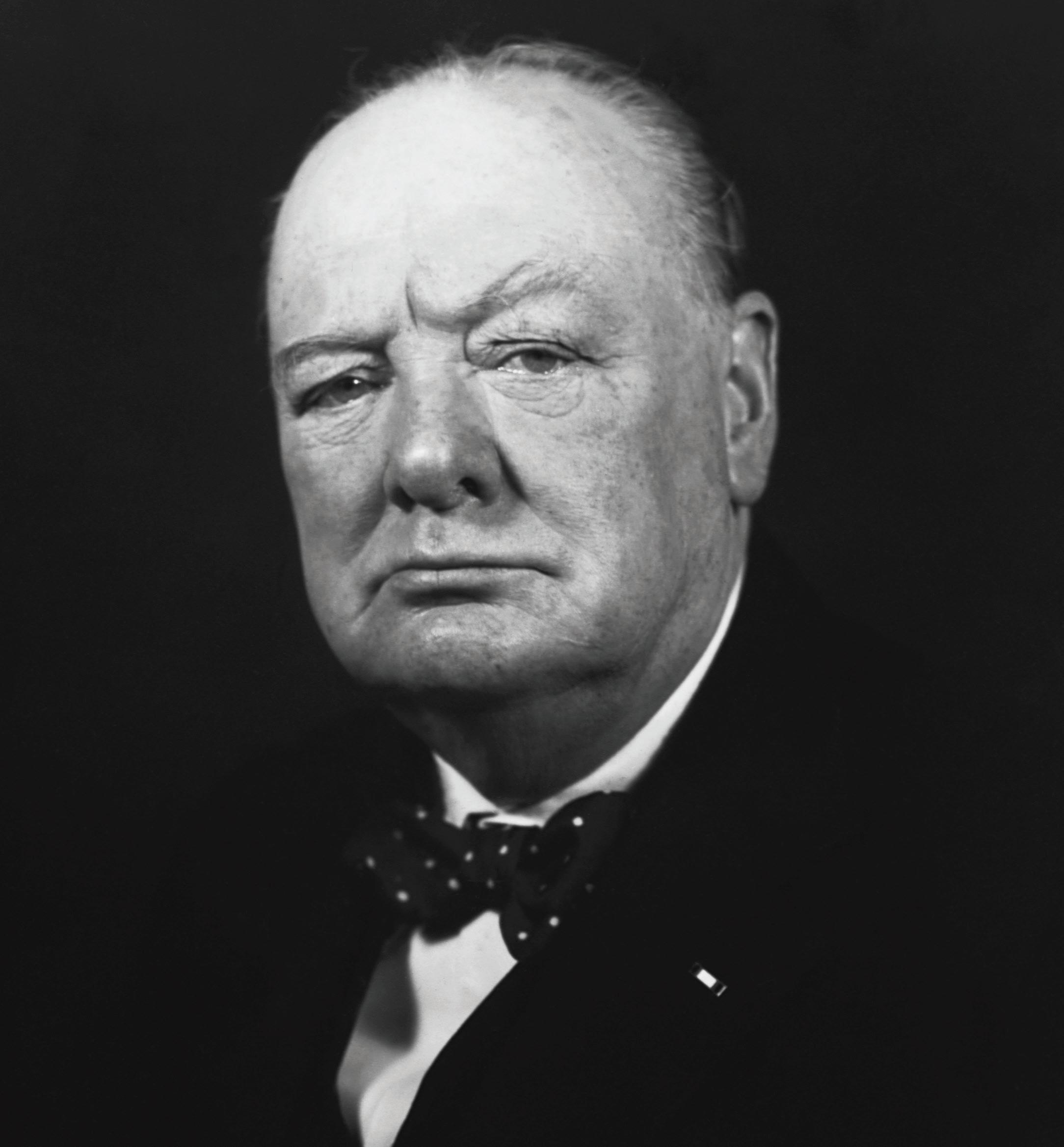 by Tim Oliver & Garvan Walshe
by Tim Oliver & Garvan Walshe
President Biden’s recent visit to the UK, a stop-over on his way to the NATO summit in Lithuania, triggered British angst about whether the UK and U.S. still have a “special relationship” (Biden had not turned up for King Charles’s coronation). Like so much in the British view of its role in the world, the term is Churchill’s (which he coined in a 1946 address in Fulton, Missouri). Yet the rhetoric is underpinned by a culture of practical cooperation that the U.S. does not have with any other ally. Countries like France may share the UK’s skills, or Canada its geopolitical worldview, but no single other country has both.
This shared outlook and cultural fit mean that for the Special Relationship to end, six highly unlikely things would have to happen: the UK would decommission its nuclear weapons and submarines; London would give up having a global intelligence service; the British military would abandon efforts to align key capabilities with those in the USA; Churchill’s grip on Britain’s worldview would fade; the English speaking world would no longer be the focus of so much in British politics and society; and the security and stability of Europe would not be in doubt.
The operational core of the Special Relationship rests
on collaboration in intelligence, special forces, and nuclear weapons. In these three areas, the UK and U.S. give each other trust they extend to no one else. The trust is maintained not by presidents and prime ministers, but by officials and military personnel working closely together, as they have done for decades.
It is founded on the most intimate of international exchanges — nuclear weapons expertise, which goes back to “TUBE ALLOYS,” as the British involvement in the Manhattan Project was encoded. Today, Britain’s nuclear deterrent relies on access to 58 missiles from a shared pool of Trident II (D5) missiles. Britain provides its own warheads and submarines, but the missile system is American-designed and maintained.
The biggest threat to this is not a desire to break from the USA, or U.S. opposition to continuing to share missiles, but Scottish independence. The Scottish National Party — whose political success led to Scotland’s 2014 referendum on independence — has long been clear that an independent Scotland would no longer be the home of Britain’s nuclear deterrent. The lack of an immediate alternative location (especially for storing the warheads) elsewhere in the UK could mean the end of Britain as a nuclear power.
But even if the UK were to lose its nuclear weapons, the recent AUKUS agreement between Australia, the UK, and the USA would mean continued close cooperation between the post-Scotland UK and U.S. submariners, engineers and officials. The deal — reputedly designed to last 100 years — revolves around close cooperation on nuclear submarines (but not nuclear missiles) and other defense technology, such as hypersonic weapons.
It boosts the UK’s role in the Pacific, something UK policy makers have been keen to push. It also enables the U.S. to work closely with two countries with whom it shares a close strategic and operational outlook. Through AUKUS, the UK has become the USA’s staunchest European ally in its plans to deter China across the Pacific.
Nor is the UK about to give up on intelligence and special forces. The close working relationship between the UK’s Government Communications Headquarters (GCHQ) and the USA’s National Security Agency (NSA) is often, for understandable reasons, hidden from sight. The shrinking British military has had to specialize, with a focus on interoperability with U.S. forces and those of a few other NATO allies. There is no desire in the UK to limit intelligence capabilities.
Ending the relationship would also require more than the tearing apart of the day-to-day operations. The UK would have to give up on essential cultural links.
First would be moving on from the Anglo-American statesman whose views still defines so much of the UK’s worldview — Winston Churchill. While U.S. foreign policy debates can be defined by four archetypes (Hamiltonian, Wilsonian, Jeffersonian and Jacksonian), an AngloAmerican Churchillian outlook dominates British foreign policy to such an extent that as the historian Timothy Garton Ash has argued, “all British foreign policy since 1940 has been footnotes to Churchill.”
Churchill framed the UK’s place in the world through three overlapping circles, of which the UK’s relationship with the USA and the English speaking world was one, with Europe and the Empire being the other two.
This English speaking world retains such a hold on the outlook of many in the UK that it could only be broken if Britons started learning other languages. Talk of the ‘Anglosphere’ as a political or strategic actor is overplayed; but the emotional, cultural, and economic pull remains very strong. Britons have always migrated in larger numbers to the USA, Canada, and Australia than to the rest of the EU combined. Even when the UK was in the EU, British politicians often prioritized relations with their Democrat and Republican opposite numbers.
Finally, Brexit, the most important issue in British politics, has strengthened the specialness of the relationship, at least in British eyes. The UK market is now in play in the wider game of regulatory competition between the U.S. and EU, with an opportunity for Britain to escape Brussels’ clumsy constriction of innovations in Artificial Intelligence. Polling tells us that moving the UK market away from the EU’s regulatory ecosystem is not something Britons are keen on, but that won’t stop efforts by either the USA or some in UK business who want to see Britain diverge from Europe.
Finally, there’s the issue — and here we find that AngloAmerican Churchill at play again — that bound the UK and USA together in World War II and the Cold War: European freedom. Russia’s invasion of Ukraine reminded many in Britain that the country’s first and foremost foreign policy goal remains a Europe wholly free. Since World War II the Special Relationship has been indispensable to keeping the USA committed to NATO.
It remains so today. RF
Tim Oliver is Director of Studies and Senior Lecturer for the Institute for Diplomacy and International Governance at Loughborough University London. Garvan Walshe serves as Director of Communications for the European Policy Centre in Brussels and is a former policy advisor to the British Conservative Party.
The term is Churchill’s, yet the rhetoric is underpinned by a culture of practical cooperation that the U.S. does not have with any other ally.
After the 2016 referendum but prior to the implementation of Brexit, two main points about its coming economic impact were evident: First, gravity matters. One of the few things that economics can treat as nearly a physical law is that economies trade and invest primarily with the economies that are closest to them geographically and historically. Brexit was running in the face of that.
Second, Brexit would affect more than just international trade. Instead, it had to be seen in a political context as well as an economic context of broader EU–UK commercial interactions involving foreign direct investment (FDI), financial flows, information networks, and immigration. As has been amply documented, most economic trends post-Brexit have come out pretty much as the mainstream economists expected, including losses of around 4% of GDP versus pre-Brexit trend growth.
During the 1990s through the mid-2010s until the Brexit referendum, the UK was one of the most open and large economies in the world. On trade, it was comparable to France, Germany, Italy, and Spain, and it had larger inflows of FDI, immigration, foreign students, and financial capital; it far outstripped the U.S., Australia, and Canada proportionally for its size on the same measures. Thus, Brexit was not a small adjustment, but potentially a shift in the entire orientation of the UK economy, because it would impose a huge terms-of-trade shock to trade with its primary trading partner.
does look different from its peers: its trade and, more importantly, its private investment has recovered less from Covid-19 than other high-income economies, its labor mismatch problem has been more severe and lasting than that of the U.S., and its productivity growth has persistently lagged its peers.
Adam S. Posen
Looking at receptiveness to foreigners, the UK had a long period, starting in the early 2000s, when it was attracting and retaining a large number of foreignborn people. After Brexit, EU immigration tailed off and became negative. The UK has not seen a decline in non-EU immigration and some evidence suggests there has been even a significant surge. It is noteworthy that, when so much of the pro-Brexit referendum campaign seemed to have been run on xenophobia (if not outright anti-migrant claims), we see a shift in terms of migration from EU sources to elsewhere. Whatever the expansion in non-EU migration, however, it is not strictly compensatory for the lost EU workers; importing more doctors and students does not make up for workers in agriculture, transport, hospitality and construction.
There is no simple automatic mapping between international economic openness and per capita GDP growth, so this is not necessarily a welfare loss, and voters who chose Brexit may have had non-economic motivations. There is clear evidence, however, that post-Brexit Britain
There has been a lot of attention in the UK on financial capital flows, whether it be the City of London managing other people’s money, oligarchs from Russia and the Middle East putting money into London real estate, or part of the long history of worrying about the pound. What often gets overlooked is the issue of how much FDI the UK used to attract (both brownfield and greenfield). There is clear evidence that inward FDI is extremely positive for growth, tending to lead to higher-wage jobs, more advancement in innovation and technology, more transfer of skills, and more sales of associated business services.
Most economic trends post-Brexit have come out pretty much as the mainstream economists expected, including losses of around 4% of GDP versus pre-Brexit trend growth.
Yet, already by 2017, it was clear that while the UK auto industry (meaning Toyota, Nissan, Ford, Vauxhall, and Land Rover) would not immediately stop producing cars in the UK, it would soon stop producing them for export to Europe. Therefore, the plants and the associated investment would decline over time and would not be replaced. This is what we are seeing across other industries as well as autos.
Similar to immigration, but over a longer period in the 1990s and early 2000s, the UK was a leading recipient of inwards foreign direct investment. It is no coincidence that this period coincides with the Maastricht Treaty allowing the UK a prime role as a bridge into European markets for American, Chinese, and Japanese companies. However, FDI inflows to the UK have fallen back in recent years. The UK is no longer a positive outlier compared to other, similar economies in terms of inward foreign direct investment.
What remains to play for is what economists refer to as the dynamic effects of openness, essentially what affects the trend growth rate going forward. The basic concern when a country shrinks trade and openness is that it is losing competition internally. Therefore, it gets less innovation and dynamism in its corporate sector, investments, and labor force. Dynamism also tends to decrease when it loses diversity of talent coming in, diversity of corporate cultures coming in, and so on. While the direct effect of
trade on productivity growth is arguable but not evident, the direct effect of immigration and FDI on productivity growth is quite clear and strong. The collapse in corporate investment in the UK since Brexit, not recovering as it has in peer countries post-Covid, indicates this coming to pass.
As Adam Smith famously said (when Great Britain lost the Battle of Saratoga to the American revolutionaries), “there is a lot of ruin in a nation” — meaning even visible major setbacks are not enough to destroy a country’s wellbeing. The same is true of Brexit. The UK will remain among the 10 largest economies in the world, punching above its weight in business and financial services, in higher education, in cultural exports and tourism, and in foreign policy.

If it wishes to offset or replace the economic dynamism lost to Brexit, however, it should lean further into those strengths, and compete internationally on that basis. Trying to replicate the strengths of the EU or the U.S. in terms of diversified industry, let alone size of market, will be impossible. Being a location which attracts human and investment capital is attainable. RF
Adam S. Posen is President of the Peterson Institute for International Economics. In 2014, he was made a Commander of the Most Excellent Order of the British Empire by H.M. Queen Elizabeth II, for his services to UK economic policy.
“Ideas that matter, since 1965.“
There is clear evidence that postBrexit Britain does look different from its peers — its trade and private investment has recovered less from Covid-19 than other high-income economies, its labor mismatch problem has been more severe and lasting than that of the U.S., and its productivity growth has persistently lagged behind its peers.
 by TORI K. SMITH
by TORI K. SMITH
Earlier this summer, British Prime Minister Rishi Sunak visited Washington, D.C., where he met with President Biden, members of Congress, and the U.S. business community.
During the trip, Sunak and Biden announced the Atlantic Declaration, intended to serve as a vector for the two countries to “build resilient, diversified, and secure supply chains and reduce strategic dependencies.”
Biden has pursued similar efforts with the United Kingdom before, as when he and former Prime Minister Boris Johnson announced the New Atlantic Charter in June 2021 to reaffirm and revitalize the bilateral relationship. While these efforts are welcome, and certainly come with flashy headlines, they do little to materially increase bilateral trade flows or improve the freedom of Americans and Brits to exchange with one another if there is not follow through.
The 2021 New Atlantic Charter did little to change the status quo because the Biden Administration has not made pursuing trade agreements a priority. A similar fate could befall the 2023 Atlantic Declaration. To follow through on both initiatives and strengthen economic ties, the United States should focus its efforts on two tasks: (1) remove the tariff rate quotas on UK imports of steel and aluminum; and (2) approve Trade Promotion Authority (TPA) for the United Kingdom and finish negotiating a free trade agreement (FTA).
The United States imposed tariffs of 25% on steel and 10% on aluminum imports in 2018 from nearly every country, arguing the imports threatened to impair
U.S. national security. In March 2022, the Biden Administration replaced the tariffs on UK imports with a tariff rate quota (TRQ), which allows imports under the average import volumes of 2018 and 2019 to enter tariff-free.
While the change lessened the tariffs’ costs by an estimated $338 million, there are still higher barriers to trade now than there were before 2018. After all, any imports above those averages are subject to high tariffs. Additionally, TRQs themselves are a barrier to trade because they restrict imports by capping demand and penalizing increasing import levels. For American companies, TRQs can create uncertainty over whether imports will exceed the quota and limit the ability of those businesses to grow by limiting their access to greater imports.
K. SmithIn effect, these TRQs signal that growth in steel and aluminum imports from the UK is still a threat to U.S. national security. That couldn’t be further from the truth. The United States should be looking to import more from the UK than it did pre-pandemic, especially as the Administration seeks to diversify supply chains out of China. Removing the TRQs on steel and aluminum from the UK would only help that effort.
Another key way to increase bilateral trade and deepen U.S.-UK economic ties is to finalize and implement a U.S.-UK FTA. Such an agreement would grow both economies and ease trade by reducing and eliminating regulatory barriers. This agreement was being actively negotiated during the Trump Administration, but President Biden abandoned the talks upon taking office.
The United States should be looking to import more from the UK than it did pre-pandemic, especially as the Administration seeks to diversify supply chains out of China.
To add insult to injury, the tool to negotiate trade agreements and have them receive expedited approval in Congress, Trade Promotion Authority, expired in July 2021. Legislation to have TPA for a U.S.-UK FTA has been introduced, but Congress has not acted on it. This is ostensibly because the Biden Administration has sought executive agreements and trade forums that exclude market access.
Securing TPA for an FTA with the United Kingdom should be a priority for Congress. A UK-specific TPA wouldn’t require the Biden Administration to negotiate an FTA with the country, but it would send a clear signal to the Administration that this is where Congress thinks the Office of the U.S. Trade Representative should focus its resources. Moreover, trade agreements are a proven tool for strengthening
supply chains.
The New Atlantic Charter and the Atlantic Declaration make ambitious statements about the need to strengthen the U.S.-UK economic relationship, but without bold action these initiatives will not materially change the status quo. Removing TRQ on UK steel and aluminum imports and negotiating and implementing a U.S.UK FTA would make substantial progress in strengthening the bilateral economic relationship. RF
Tori K. Smith is Director of International Economic Policy at the American Action Forum. Her research focuses on international trade, the economic impacts of tariff and non-tariff barriers on American businesses and consumers, and the intersection of trade and broader international economic policy.

We will not rest until mental illnesses and brain diseases are approached with the same priority and urgency as our physical health and recognized as chronic diseases that warrant early, equitable, and accessible intervention.
Through products, programs, policies, and advocacy, Otsuka-people will defy any limitation that stands in their way until every mind is valued.




Discover our commitment to health for every mind
Otsuka is proud to support the Ripon Society
The New Atlantic Charter and the Atlantic Declaration make ambitious statements about the need to strengthen the U.S.-UK economic relationship, but without bold action these initiatives will not materially change the status quo.
At Otsuka, we hold a deep respect for the value of every mind.
At his meeting on July 10th in London with UK Prime Minister Rishi Sunak, President Biden described the relationship between the two countries as “rock solid.” But is it “special” and does it matter?
For the British political establishment, and to a large extent for the British public, this question has defined the relationship at least since the Second World War, as a key measure of the country’s place in the world. Despite its ups and downs, from Suez to the epoch-defining Reagan-Thatcher partnership and more recently, its durability, based on democratic values and shared security interests, has rarely been disputed.
The security relationship was built at the end of the Second World War and saw both countries through the Cold War, a period of bipolar geopolitics with its principal theatre in Europe. How does it stand up in today's bipolar-to-multipolar world, where the focus of attention for the U.S., is increasingly the Pacific?

Ukraine has reaffirmed the salience of the relationship. Much can be understood from two key politico-military ratios. The U.S. and UK are the two largest providers of military assistance to Ukraine. But the gap between the U.S. commitment (around $38 billion) and the UK’s ($5.9 billion) is also highly significant. Taking a snapshot today, far more unites the two countries than divides them.
The UK’s starting point is security in Europe and even closer to home – the country remains stung by the Russian Novichok attack in Salisbury, England in 2018 – while for the U.S. its position on Ukraine crucially reflects the need to deter Chinese aggression against Taiwan. The UK has of course also made an important commitment to Indo-Pacific security through the AUKUS Agreement.
Despite this close alignment, there is a marked difference in both elite and public opinion between the two allies. While in the U.S. a lively debate as to how far it is in American interests to go in support of Ukraine, in the UK it is barely possible to hear a politician or media voice (with the exception of far-left former Labor Party leader Jeremy Corbyn) challenging the commitment.
This unity of elite opinion is substantially reflected in the findings of the British Foreign Policy Group’s recent survey. According to the poll, a majority of Britons support all forms of aid provided to Ukraine and believe that the UK should support Ukraine for ‘as long as it takes,’ even including providing military aid to Ukraine such as missiles, armored vehicles and ammunition (69%). A majority, though markedly smaller, favors providing Ukraine with F-16 fighter jets.
Where next for the relationship? Recent disagreements – on F-16s (UK in favor, U.S. reluctant) and cluster bombs (U.S. in favor, UK a signatory to the international convention and therefore against) reflect a wider post-Cold War divergence (especially since the late 1990s Labor government), with the UK increasingly prepared to put the establishment of international norms above its own freedom of movement: some U.S. commentators might argue that the U.S. still shoulders the lion’s share of the commitment and cannot afford the same luxuries.
These differences are largely baked in. More important is the scope for divergence if – as seems likely – the conflict drags on without a definitive Ukrainian victory and, potentially, with a new Administration in Washington less committed to “whatever it takes.”
In this scenario, a negotiated settlement, with whatever
The U.S. and UK are the two largest providers of military assistance to Ukraine. But the gap between the U.S. commitment (around $38 billion) and the UK’s ($5.9 billion) is also highly significant.
David Landsman
guarantees for Ukraine, if advocated by the U.S. and doubtless welcomed in much of Europe, would find a substantial part of British public opinion – which has not been prepared for anything other than a “triumph of good over evil” in a distressed position. Our survey found that the majority of Britons (53%) believe the UK should support Ukraine for as long as it takes, while a third (33%) of Britons believe the UK should encourage Ukraine to reach a peace deal. However, just 6% of Britons believe the UK should immediately withdraw from Ukraine. A further 9% of Britons are unsure of their view. It isn’t difficult to imagine that this slender majority could be eroded over time.
Whatever the outcome, how should the U.S. and UK work to bring the war to an end on acceptable terms? Military support is clearly essential, but so is diplomacy, abroad – and also at home. Maintaining Western unity and limiting visible differences beyond Vilnius is necessary but not sufficient. Sometimes a widely supported compromise may
be better than contested “stretch goals.” Secondly, outreach needs to go beyond the West. The UK’s support for Ukrainian diplomatic engagement with the Global South has been valuable: resistance to the violation of a country’s territorial integrity is likely to resonate beyond Europe far more than a “war for Western values.” And finally, maybe most importantly, both countries would do well to keep reflecting on the nuances of domestic public opinion as the conflict evolves, in order to explain why, beyond easy slogans and graphic media images, the conflict really matters to Western interests. RF
David Landsman is Chair of British Expertise International and a Senior Adviser at BFPG and at its sister organization The D Group. He is a former British diplomat and senior executive whose main area of interest now is the interface between business, government and geopolitics. His diplomatic career included serving as British Ambassador to Albania and Greece and working on defense and proliferation.
At Netflix, we want to entertain the world. We’re streaming in more than 30 languages and 190 countries, because great stories can come from anywhere and be loved everywhere. We are the world’s biggest fans of entertainment, and we’re always looking to help you find your next favorite story.

Our survey found that the majority of Britons (53%) believe the UK should support Ukraine for as long as it takes, while a third (33%) of Britons believe the UK should encourage Ukraine to reach a peace deal.Proud to Support the Ripon Society
Since 1949, the year Mao Zedong stood on the rostrum at Tiananmen and declared the founding of the People’s Republic of China (PRC), London has struggled with its relationship with Beijing. Then, and now, Britain strives to keep UK-China bilateral trade and other interests stable while attending to American security concerns.
Over time, a “tick-tock” sort of dichotomy has developed, as bilateral relations swung from one extreme to another. The latest change saw the positive “golden era” of UK-China relations, heralded by former prime minister Theresa May in 2018, fall victim to what Mao Zedong might have dubbed “antagonistic contradictions” – the aggressive policies of Chinese Communist Party (CCP) secretary Xi Jinping.
A full description of Xi’s behavior rankling London would be too long to list here, but it includes the premature scrapping of “one country, two systems” for Hong Kong in violation of the SinoBritish Joint Declaration of 1984; the repressive and transnational National Security Law foisted on that territory by the CCP; running three “police stations” on British soil; assaults on a BBC journalist in China and a peaceful demonstrator in Manchester; technology and trade secret theft; an influence scandal, and so on. Taken together, it seems like a program designed to outrage Britons, stimulate Parliament to implement trade and other restrictions, and push the UK into the arms of the Americans.

Past swings of the pendulum are illustrative. British interests in Asia from the 1950s until the 1997 return of Hong Kong made London useful as a partner to the CCP, posing occasional opportunities to subvert the UK-U.S. relationship. It was an
uphill battle for Beijing, albeit with occasional victories. London allowed much bilateral trade during the U.S. embargo after the Korean War, and approved technology exports Washington would never have considered, such as the 1963 sale of Vickers turboprop aircraft and of Trident jets in 1971. But in the end, Beijing did not succeed in sabotaging the UK-U.S. “special relationship.”
The passage of decades has changed the landscape. After the 1997 Hong Kong handover, London was suddenly less important to Beijing, and popular Chinese thinking more easily shifted toward revenge for Britain’s key role in China’s “Century of Humiliation.” That 100-plus years after Britain’s 1842 military victory over China included British companies peddling opium that ruined the lives of countless Chinese people, while Britain took control not only of Hong Kong, but also of huge swathes of the country as semi-colonial “spheres of influence.” It is a record underlined to Chinese students from primary school onward.
Two years before Prime Minister Sunak declared the “golden era” to be finished, Nigel Inkster, the former director for operations and intelligence for MI-6, now the senior advisor for cybersecurity and China at London’s Institute for Strategic Studies in London, commented that, “There was a misapprehension and a lot of wishful thinking about what China really was.” Another former British official and China expert, Charles Parton, quipped that he preferred to think of the period as the “golden error.”
Since then, Britain has moved toward a harder line. On July 13th, a UK Parliament committee, independent of the Prime Minister’s office, issued a report saying that China’s
British interests in Asia from the 1950s until the 1997 return of Hong Kong made London useful as a partner to the CCP.
“The so-called ‘golden era’ (in UK-China relations) is over, along with the naïve idea that trade would lead to social and political reform.”
Rishi Sunak, British Prime Minister November 29, 2022
“whole of state” efforts against Britain’s economy, politics, civil infrastructure, and academia were not being adequately addressed. The UK is, “playing catch-up and the whole of Government has its work cut out to understand and counter the threat from China.” In particular, “China’s state intelligence apparatus – almost certainly the largest in the world with hundreds of thousands of civil intelligence officers… targets the UK and its interests prolifically and aggressively, and presents a challenge for our agencies to cover.”
Such Chinese efforts seem embedded in many corners of the bilateral relationship. For example, in June, the Great Britain China Centre (GBCC), an independent body established by the UK Foreign, Commonwealth, and Development Office, convened the 11th UK-China Senior Leadership Forum. It was a laudable effort to keep channels open between the two governments.
But GBCC’s long standing Chinese partner, the International Liaison Department (ILD) of the CCP, should have raised eyebrows long ago. The ILD is not well-known outside of China, but was described by Professor Anne Marie Brady, an expert on Chinese influence operations based in
New Zealand, as “tasked with gathering intelligence on foreign politicians and political parties, and developing asset relations with them.” In other words, the ILD works somewhat like an intelligence agency, albeit one that specializes in foreign political parties and their members. Not exactly a level playing field or a match made in heaven.



The situation suggests that Beijing’s relations with London, as with a number of other capitals in Europe, Asia, and North America, will remain fraught until Xi Jinping’s policies change. That seems unlikely. Given his recently extended lifetime tenure, personality cult, and careful study of Mao Zedong’s rise to unchallenged power in the 1940s — when the Chairman relentlessly struggled against all whom he considered enemies — a difficult period lies ahead. The pendulum of China’s tick-tock relations with Britain appears stuck at a cold extreme.
RFMatt Brazil is a Senior Fellow at the Jamestown Foundation and a China analyst at BluePath Labs. With Peter Mattis, he is the co-author of Chinese Communist Espionage, and Intelligence Primer
As we celebrate our 125 anniversary, we’re meeting today’s needs for renewable, fiber-based packaging and pulp while sharpening our focus on the future. International Paper – here for what’s now and creating what’s next.
After the 1997 Hong Kong handover, London was suddenly less important to Beijing, and popular Chinese thinking more easily shifted toward revenge for Britain’s key role in China’s “Century of Humiliation.”

The landmark trilateral agreement among Australia, the United Kingdom (UK), and the United States to provide Australia with nuclear-powered submarines (the so-called AUKUS agreement) is the Biden Administration’s signature Indo-Pacific initiative, showing United States’ commitment to working with its closest allies to deter China. In transferring this sensitive technology for the first time in over 60 years (the only other country to receive it was the UK in 1958), the Biden Administration is acknowledging the critical role of Australia in helping to establish deterrence at a time when tensions between the United States and China are on the rise.
AUKUS is a long-term endeavor. While Australian naval officers are already receiving training in the United States and U.S. nuclearpowered attack submarines (SSNs) have begun regular visits to Australia, it will take more than 15 years before Australia can produce its own SSNs. In the interim, the U.S. has announced it will transfer three to five Virginiaclass submarines to Australia over the next decade while Canberra ramps up indigenous capabilities. Nuclearpowered submarines are critical for deterrence in the Indo-Pacific as they allow for longer duration deployments and can operate in contested waters at lower risk, given their greater maneuverability and stealth capabilities.
AUKUS is about more than just sharing submarine technology, however. It is a comprehensive technology and industry cooperation agreement that seeks to pool the three countries’ technology research and its application to critical defense capabilities in eight areas, including cyber, artificial intelligence, quantum computing, hypersonics, electronic warfare, innovation, information
sharing, and advanced undersea capabilities. Under this so-called “Pillar Two” of AUKUS, the three nations will enhance their collective competitive edge vis a vis China in the race to establish technological dominance, especially in the defense domain.
Speaking at a Washington-based think tank in June, U.S. Chief of Naval Operations Admiral Michael Gilday said the AUKUS partnership will be transformational for governmentindustry cooperation, noting that the three governments needed to effectively leverage the research their respective defense industries were already performing.
While AUKUS has been wellreceived by countries like Japan and India (that make up the other half of the Quad that includes Australia and the United States), some Southeast Asian nations worry that AUKUS is fueling military tensions between the United States and China. Indonesia and Malaysia, for their part, have raised nuclear proliferation concerns, even though International Atomic Energy Agency Director General Rafael Mariano Grossi recently expressed confidence in Australia’s commitment to upholding its nuclear nonproliferation obligations. Countries like Vietnam and the Philippines that are increasingly concerned about Chinese maritime intrusions and grey zone activities in the South China Sea, on the other hand, may see value in a multination effort to push back against increasingly assertive Chinese maritime behavior. In any case, the U.S. and its partners must be alert to Chinese disinformation campaigns that will seek to undermine regional support for the initiative.
Why the new alliance between the U.S.,
is so important to Indo-Pacific
Lisa Curtis
AUKUS is about more than just sharing submarine technology. It is a comprehensive technology and industry cooperation agreement that seeks to pool the three countries’ technology research and its application to critical defense capabilities in eight areas…
The second obstacle is the sheer cost of the endeavor. Australia has committed to investing around $3 billion to expand the U.S. shipbuilding industry, which could help make the effort more palatable to U.S. taxpayers as well as U.S. legislators who have raised concerns about over-taxing American shipyards, which already are hard-pressed to meet the U.S. Navy’s needs. The cost of the project for Australia, which is estimated at between $183 billion and $250 billion over the next 30 years, is sparking a fierce domestic debate on tax hikes and other spending cuts that may be necessary to support the massive project price tag.
Perhaps the biggest hurdle to implementing AUKUS comes from the tangled web of U.S. export controls and regulations on transferring sensitive technology. Foreign companies seeking to import technologies that are on the International Traffic of Arms Regulations (ITAR) list must meet specific conditions to gain a license for importing sensitive items. The U.S. Congress is currently considering
various pieces of legislation aimed at relaxing some of these controls. AUKUS has strong bipartisan support, but the complex array of regulations over which multiple U.S. government agencies have discretion is likely to prove difficult to unravel.
AUKUS
demonstrates that the United States and its allies are prepared to act in unison and break down the barriers to sharing the most advanced military technology to maintain peace and order in the Indo-Pacific. While delivery of the submarines will take time, the three nations must move expeditiously with implementing Pillar Two on cooperation on advanced capabilities to get the ball rolling and prove the merits of AUKUS sooner than later. RF
Lisa Curtis is Director of the Indo-Pacific Security Program at the Center for a New American Security. She previously served as Deputy Assistant to the President and NSC Senior Director for South and Central Asia from 2017 to 2021.


Perhaps the biggest hurdle to implementing AUKUS comes from the tangled web of U.S. export controls and regulations on transferring sensitive technology.
On March 5, 1946, Winston Churchill traveled to the United States to deliver a speech at Westminster College in Fulton, Missouri. It was a time of transition for both Churchill and the world.
The previous summer, in July 1945, he had been unceremoniously voted out of office as British Prime Minister less than a month after leading his country to victory in World War II. The war over, the world stood on the precipice of a new epoch – a Cold War.
Churchill’s objective that day in Fulton was to define the new epoch. And he did just that. The address he delivered will long be remembered as the speech that introduced the term “Iron Curtain” to the world. “From Stettin in the Baltic to Trieste in the Adriatic, an Iron Curtain has descended across the Continent,” he famously declared.
But the address will also be remembered as the speech that introduced another term to the world – “the Special Relationship.” “Neither the sure prevention of war,” the Last Lion stated, “nor the continuous rise of world organization will be gained without what I have called the fraternal association of the English-speaking peoples. This means a special relationship between the British Commonwealth and Empire and the United States.”
Seventy-seven years later, the Iron Curtain has fallen, but the Special Relationship remains. With war once again raging in Europe, and threats from China and elsewhere rising in an increasingly volatile world, it is a good time to look at the origins of the Relationship and why the U.S.-UK alliance
remains so critical to global peace and security today.
If the Special Relationship between the U.S. and UK took root with Churchill’s speech in Fulton in 1946, one could argue that the seeds of the relationship were planted with a visit the British Leader made to Washington in 1941.
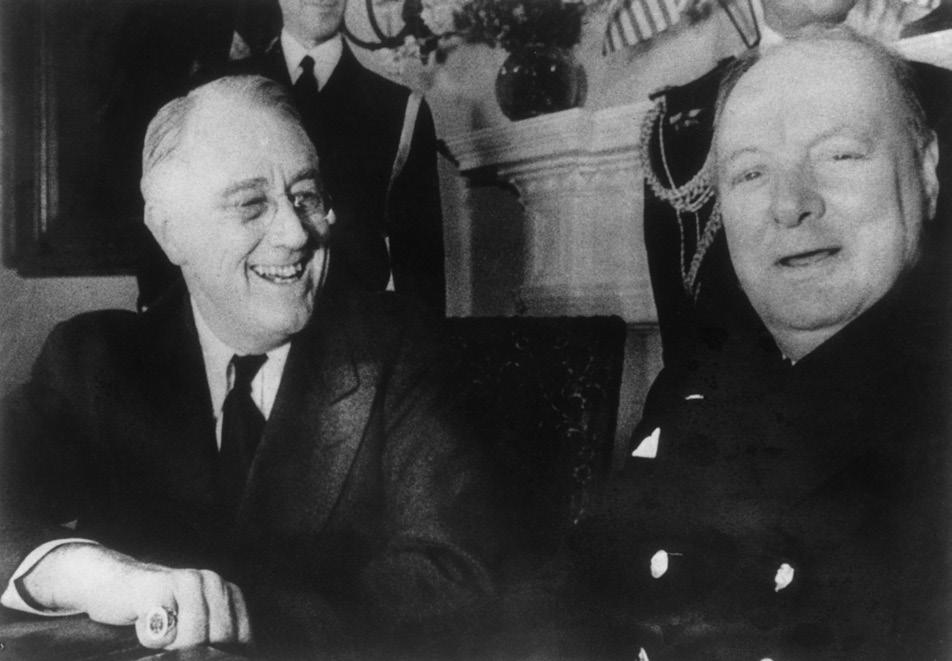
It was December 22 — three days before Christmas and 15 days after Japan’s stunning attack on Pearl Harbor. Churchill arrived at the White House after a cold and foggy Atlantic crossing aboard the Duke of York, eager to establish a new relationship with President Franklin D. Roosevelt.
He ended up staying at the Executive Mansion for three weeks, celebrating the holidays with FDR and Eleanor and, as writer Erick Trickey recounted in 2017, bonding with the President “over latenight drinking sessions that annoyed the First Lady, taxed White House staff, and cemented the partnership that won the world war.”
The bonds between the two nations were further cemented the day after Christmas, when Churchill became the first Prime Minister to address Congress. In a speech that was broadcast live over the radio both nationally and internationally and interrupted repeatedly by thunderous applause in the Senate chamber, Churchill boldly predicted the allies would prevail, saying “the British and American peoples will, for their own safety and for the good of all, walk together in majesty, in justice and in peace.”
If the Special Relationship between the U.S. and UK took root with Churchill’s speech in Fulton in 1946, one could argue that the seeds of the relationship were planted with a visit the British Leader made to Washington in 1941.U.S. President Franklin Roosevelt and British Prime Minister Winston Churchill at the White House in December 1941.
As both nations increasingly cooperated on the Pacific and European fronts to defeat Japan, Germany, and Italy, the seeds of the Special Relationship began to grow. British scientists joined Robert Oppenheimer and other American scientists working on the Manhattan Project British and American pilots led joint air-raids across Europe. And a joint invasion of Northern Africa, Italy and Northern-France provided “the first broad hints,” as the Times reported, “that someday the two nations might draw together.”
By the end of the war, a formidable alliance had been forged that would outlast the initial conflict against fascism. In February 1945, meeting this time at the Crimean coastal town of Yalta, Churchill and Roosevelt, alongside Soviet leader Joseph Stalin, outlined a joint vision for post-war Europe. FDR declared that the emergence of “a new world order” spearheaded by the U.S. and UK’s joint commitment to “peace, security, freedom, and general well-being of all mankind.”
With much of Europe in ruins and the Iron Curtain of Soviet totalitarianism seeking to broaden its reach across the continent, the burgeoning alliance between America and Britain became even more vital for the preservation of democratic order.
In the years following the war’s end, there was no greater symbol of the power and potential of democracies to be a force for good than the Marshall Plan. The United Kingdom would eventually become the largest beneficiary of the Plan, receiving over $3 billion in aid — or a quarter of the total funds provided. It was — both literally and figuratively — an investment in freedom.
In June 1948, the forces of freedom received their first real post-WWII test when Soviet forces blocked rail, water, and roadway access to Allied-controlled areas of Berlin. In the face of this aggression, the Special Relationship between the United States and United Kingdom would prove its worth. As part of the Berlin Airlift, the two countries joined together to conduct a total of 189,000 airdrops over the next year, delivering over 2.3 million tons of vital food and fuel to the people of West Berlin.
In the coming decade, not all tests of the Special Relationship would prove to be external. During the Suez Canal Crisis of 1956, for example, the U.S. and the UK found themselves on different sides of the conflict. The conflict began on July 26, when Egyptian President Gamal Abdel Nasser announced that he was nationalizing the Suez Canal Company, a joint British-French enterprise which had owned and operated the Canal since its construction in 1869. The U.S. attempted to broker a peaceful settlement to the dispute. Britain, however, decided to work with France and Israel to launch a military
strike against Nasser, whom the Israelis viewed as a threat. The strike took place on October 29, when Israeli forces attacked the Sinai Peninsula, advancing to within 10 miles of the Suez Canal. Two days later, Britain and France would send in troops of their own.
The United States viewed the attack as an unnecessary distraction from another crisis that was then unfolding in Eastern Europe — the Soviet Union’s brutal suppression of an uprising in Hungary. In response, the Eisenhower Administration secured a resolution from the United Nations General Assembly condemning the invasion. It also sent a clear signal to their erstwhile British allies that they would not receive American support. Without this support, the handwriting was on the wall. Along with France and Israel, Britain withdrew their forces from the Sinai, bringing the crisis to an end.
If the Suez Crisis caused a certain chill in the Special Relationship between the United States and United Kingdom, it didn’t take long for the ice to thaw. Indeed, less than two years later, on July 3, 1958, the U.S. and UK signed the Mutual Defense Act, a bilateral treaty which paved the way for the two nations to share sensitive defense information related to nuclear weapons, naval nuclear propulsion, and nuclear threat reduction. Then-British Prime Minister Harold McMillan called this agreement the “great prize,” and it would go on to form the foundation for U.S.-UK defense cooperation that continues to this day.
This cooperation in the face of potential nuclear annihilation would prove vital four years later when President John F. Kennedy called on his longtime friend, then-British Ambassador David Ormsby-Gore, to help him navigate the diplomatic and military decisions he faced during the Cuban Missile Crisis. As Gary Ginsberg recounted in a July 2021 essay for Politico, the British Ambassador played a pivotal role in bringing the world back from the brink of Armageddon. “His proximity to the seat of power did not go unnoticed,” Ginsberg wrote. “Vice President Lyndon Johnson complained that ‘the limey’ was seated ‘front and center’ at a meeting of a steering group that week in the White House Situation Room, while he himself was ‘down in a chair at the end, with the goddamned door banging in my back.’Afterward, Jackie described OrmsbyGore’s presence then and later as ‘indispensable,’ adding: ‘If I could think of anyone now [after Jack’s death] who could save the Western world, it would be David Gore.’”
Perhaps it was this type of personal connection that allowed the Special Relationship to remain intact over the next decade, when successive U.S. presidents shifted their foreign policy focus away from Europe and toward other concerns —
On July 3, 1958, the U.S. and UK signed the Mutual Defense Act, a bilateral treaty which paved the way for the two nations to share sensitive defense information related to nuclear weapons, naval nuclear propulsion, and nuclear threat reduction.
first the War in Vietnam, and then a more active confrontation of Soviet expansionism in the Middle East. By the late 1970s, the Special Relationship was described by B.J.C. McKercher, a Professor of International History and author of Britain, America, and the Special Relationship since 1941, as being “strategically faded,” even if it remained essential for peace in Europe.
This changed with the election of Margaret Thatcher as British Prime Minister in 1979 and Ronald Reagan as U.S. President a year later in 1980. Sharing common principles and a similar worldview, Thatcher and Reagan were natural allies who became fast friends. Looking back on their first meeting in 1981, Thatcher would later remark, “I knew that I was talking to someone who instinctively felt and thought as I did.” Calling each other “Maggie” and “Ronnie,” both leaders formed a close partnership that would prove instrumental in ending the Cold War.
In the years since the collapse of the Soviet Union, the Special Relationship has gone from being a partnership focused on stopping the spread of communism to an alliance that is attempting to maintain order in an increasingly volatile and chaotic world.
One could argue that the first test of that alliance came in 1990, when Saddam Hussein ordered Iraqi forces into Kuwait.
President George H.W. Bush assembled an unprecedented international coalition of 39 countries to take action in response to this aggression. The coalition included Britain and other NATO allies, as well as the Middle Eastern nations of Saudi Arabia, Syria, and Egypt.
In the lead-up to the military operation that would come to be known as Desert Storm, Bush had a conversation with Thatcher who encouraged him to stay resolute in moving forward, famously telling him, “This is no time to go wobbly.” Bush held firm and the coalition took action, repelling Iraqi forces and liberating Iraq.
Eleven years later, the international order was shaken to
its core when terrorists attacked the United States on September 11, 2001. One week after the attacks, President George W. Bush addressed a Joint Session of Congress to talk about the aftermath of the event, and the U.S. response moving forward. In a sign of how important the Special Relationship would be in that response, the only foreign leader in the House Chamber for the President’s speech that night was British Prime Minister Tony Blair, who was sitting beside First Lady Laura Bush in the gallery.
In a letter to Bush the following July, Blair reiterated his support, writing: “I will be with you, whatever.” Eight months later, the United States, along with coalition forces primarily from the United Kingdom, invaded Iraq to end the reign of Saddam Hussein and confiscate weapons of mass destruction that were believed to be in his possession. Saddam was deposed and eventually executed, but the WMD — as the world knows — were never found.
Since that time, the Special Relationship between the United States and United Kingdom has been tested in a number of ways, from the passage of the Brexit referendum by British voters in 2016 to the election of Donald Trump as U.S. President later that same year. But just as meeting the threat of Nazi Germany and the Soviet Union gave the Special Relationship a meaning and purpose in the 20th century, so too are the threats of China and Russia giving the Relationship a new meaning and purpose today.
President Joe Biden said as much during a news conference with British Prime Minister Rishi Sunak at the White House this summer, describing the Special Relationship as an “unshakable foundation.” Biden reiterated this message during a visit to London the following month, when, during a meeting with Sunak in the garden at 10 Downing Street, he declared matterof-factly, “Our relationship is rock-solid.” RF

In the years since the collapse of the Soviet Union, the Special Relationship has gone from being a partnership focused on stopping the spread of communism to an alliance that is attempting to maintain order in an increasingly volatile and chaotic world.
At Constellation, we are dedicated to lifting up our communities. We volunteer our time and commit resources to build a future in which all of our customers, employees, business partners, and communities benefit equitably from social, environmental and economic progress. We are energized by these experiences and inspired to help everyone succeed. Together we can be a catalyst for positive change in communities across America.



That’s why Constellation is proud to support the Ripon Society. constellationenergy.com

At Constellation, we are dedicated to lifting up our communities. We volunteer our time and commit resources to build a future in which all of our customers, employees, business partners, and communities benefit equitably from social, environmental and economic progress. We are energized by these experiences and inspired to help

The issue of Ukraine’s security and its NATO membership that dominated the July 11-12 Vilnius Summit is a part of a larger strategic question — are the countries east of Germany that freed themselves from Moscow’s domination starting in 1989 part of an undivided Europe? Or do all or some of them belong to a Kremlin sphere of domination and thus are excluded from the European and transatlantic family?
With the partial exception of President Trump, U.S. presidents from the early-1990s concluded that the avowed U.S. goal of a Europe whole and free was serious. All Europe ’s nations are — if they make the grade in terms of democracy, free markets, and the rule of law — eligible to join the European Union and NATO. The question at Vilnius was whether that policy extended to Ukraine.

President Clinton led the way in opening NATO’s door for Poland, Czechia, and Hungary. President George W. Bush led NATO to invite nine more countries, including Estonia, Latvia, and Lithuania. EU membership generally followed. At his last NATO Summit, in Bucharest in 2008, President Bush pushed hard to put Ukraine and Georgia on the road to NATO membership by giving them a NATO “Membership Action Plan” (or MAP). NATO split on that question — no MAP, but agreement in principle that NATO membership was the agreed objective for both countries. But over the next 15 years, neither Ukraine nor Georgia advanced toward NATO membership. In the meantime, Russia attacked both countries — Georgia in 2008 in a brief war and Ukraine in 2014 when it seized Crimea and parts of Luhansk and Donetsk Provinces; and again in 2022, when Russia launched a full-fledged war of conquest. Ukraine — fighting for its life and holding off
Russia’s army with courage, skill, and weapons from the United States and Europe — has been pushing hard for NATO membership, arguing that joining the alliance is the best and perhaps only way to end the Kremlin’s ambitions to destroy the Ukrainian nation. Ukraine’s argument is essentially that because Russia has never attacked a NATO country, peace for Europe requires Ukraine’s NATO accession. It ’s a strong argument. Putting Ukraine in a sort of “gray zone” of ambiguity means insecurity, essentially a green light for Russian President Vladimir Putin to keep trying to conquer his neighbor.
This was NATO’s challenge for its Vilnius Summit — advance Ukraine’s NATO membership while that country is at war and risk igniting a NATO-Russia conflict? Or keep Ukraine out and signal that, in the end, Ukraine is part of the Russian Empire that Putin is desperate to rebuild?
NATO did pretty well on that key question, announcing in a communique on July 11 that:
“ Ukraine ’s future is in NATO… We will be in a position to extend an invitation to Ukraine to join the Alliance when Allies agree and conditions are met.” That means basically that Ukraine won’t be invited to NATO at this stage of the war but that membership is coming. Critics point out that the language is non-binding and includes no timetable. This is true, and the language isn’t self-executing, which means Ukraine and its friends will have to push. But NATO has crossed a line — Ukraine ’s NATO membership seemed off the table just months ago, and now the issue is how and when Ukraine can join. The G7 supplemented NATO’s decision the following day by issuing a statement on July 12 offering to negotiate detailed military and
(cont’d on page 22)
Daniel Fried
Ukraine’s argument is essentially that because Russia has never attacked a NATO country, peace for Europe requires Ukraine’s NATO accession. It’s a strong argument.
According to Ukrainian President Volodymyr Zelensky, NATO’s Vilnius summit was a bust. He trashed his hosts , saying: “ It ’s unprecedented and absurd when time frame is not set neither for the invitation nor for Ukraine ’s membership. ”
Zelensky believes that Americans have an obligation to die for his country. Indeed, last November he attempted to lie NATO into the war, claiming that a Ukrainian missile which hit Poland was Russian. Washington and Warsaw knew the truth, so surely Zelensky did as well.
That he would do most anything to drag Washington into the conflict is unsurprising. But this should remind Washington that alliances are serious. They exist to safeguard security, not provide charity. The promise to go to war should be reserved for the most important interests — ones that are vital, even existential.
Ukraine is not one.
The U.S. went to war twice for Western Europe in the 20 th century. After the second time, Washington established NATO. However, its writ was limited, preventing Soviet domination of Western Europe, and temporary, providing a defense shield behind which allied states could recover.
According to historian James McAllister, “ American policymakers from Franklin Delano Roosevelt to Dwight Eisenhower strenuously tried to avoid having the future of Europe dependent on a permanent U.S. military presence on the continent.”
President Dwight D. Eisenhower was even blunter: “ We cannot be a modern Rome guarding the far frontiers with our legions if for no other reason than that these are not, politically, our frontiers.”
Ukraine ’s situation is awful, but the world is filled with tragedy. Millions of people died in the Democratic Republic of Congo a couple decades ago, with nary a mention in Washington. Young Americans
have no obligation to sacrifice their lives in endless foreign crusades.
The reason Kyiv is not in NATO now is because neither the U.S. nor the Europeans believed that Ukraine warranted war with a nuclear power. For centuries it was an imperial territory, first in the Russian Empire and second in the Soviet Union. NATO issued its welcoming statement to Kyiv in 2008 only under pressure from the George W. Bush administration. Then both Washington and Brussels spent 14 years lying to Ukraine, professing support for the latter’s accession while blocking its entry. When Russia invaded, the allies similarly refused to back Ukraine with military force.
Even European endorsement for Kyiv’s inclusion — the Baltic states and Poland are supportive, while Germany and other members are opposed — should not matter in Washington. In any hot war with Russia the U.S. would do most of the fighting and take most of the risk. European officials privately admit that their populations are tired of even funding Ukraine’s military. Worse, a 2020 Pew Research Center survey of 16 European countries found respondents 50 to 38 percent against defending their neighbors. Yet most Europeans naturally expected that the U.S. cavalry would ride to their rescue in a crisis.

In short, the likelihood of European states loosing vast legions of soldiers, fleets of tanks, and flights of planes, even if such forces existed, against Russia over Ukraine is minuscule. They expect America to defend them. Kyiv wants to join NATO to be protected by America .
Of course, Ukrainian officials deploy the full range of emotional rhetoric about fighting for Europe and democracy, but such claims are not serious. Even
(cont’d on next page)
The promise to go to war should be reserved for the most important interests — ones that are vital, even existential. Ukraine is not one.Doug Bandow
Vladimir Putin has never shown any interest in conquering Europe, evidently a hopeless quest after his bungled Ukraine venture. Washington cares about democracy except when it doesn’t, like when it underwrote Saudi Arabia’s vicious military campaign against Yemen, which killed more civilians there than Russia has in Ukraine.
Although Moscow’s invasion was unjustified and criminal, the allied commitment to expand NATO to Ukraine put the latter in the crosshairs of Putin, along with most of Russia’s ruling elite. Of course, allied officials vigorously resist any accountability for their reckless behavior toward Moscow. Yet American and European policymakers would have reacted hysterically and violently to similar
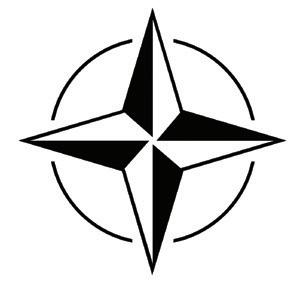


behavior by Russia (or China) in the Western Hemisphere —e.g., expanding the Warsaw Pact northward through Central America, promoting the ouster of a pro-American president of Mexico, and inviting the new government to join the hostile military alliance. The Cuban Missile Crisis demonstrated what Washington really believes about spheres of influence.
Unfortunately, Ukraine suffers in a bad neighborhood. But that is no justification for putting Americans and America at risk. Going to war is serious business. The U.S. should do so only because it must, not because it can. Ukraine is not such a cause. RF
Doug Bandow is a Senior Fellow at the Cato Institute. A former Special Assistant to President Ronald Reagan, he is author of Foreign Follies: America’s New Global Empire.
other forms of support. That’s no security commitment on the order of NATO’s Article 5. But it could be a sort of scaffolding to help Ukraine get from where it is now to where it wants to be.
Ukrainian President Volodymyr Zelensky pushed for more right up to the summit. Wisely, he chose to take what Ukraine was offered, say thank you, and prepare to push again. Fair enough. The Vilnius Summit could have gone farther. But what it achieved can be built on, frustrating Putin’s aggressive designs and advancing the growth of what we used to call the Free World.
What is the U.S. interest in all this? It is the same as our interest in World War II and the Cold War — we didn’t want aggressive dictators rampaging around Europe or
occupying half of it. We don’t want Putin to rebuild the Russian Empire through wars of conquest now. We want to see a united and secure Europe, an indispensable partner and ally for the United States in a tough world. Ukraine is fighting, as the saying goes, for its freedom and ours. RF
Daniel Fried is an American diplomat who served as assistant secretary of state for European and Eurasian affairs from 2005 to 2009 and U.S. ambassador
to Poland from 1997 to 2000. Ambassador Fried is currently a Weiser Family Distinguished Fellow at the Atlantic Council. He is also on the Board of Directors of the National Endowment for Democracy and a Visiting Professor at Warsaw University.
What is the U.S. interest in all this? It is the same as our interest in World War II and the Cold War — we didn’t want aggressive dictators rampaging around Europe or occupying half of it. We don’t want Putin to rebuild the Russian Empire through wars of conquest now.
The reason Kyiv is not in NATO now is because neither the U.S. nor the Europeans believed that Ukraine warranted war with a nuclear power.
(Fried, cont’d)
(Bandow, cont’d)


WASHIINGTON, DC -- The Ripon Society and Franklin Center for Global Policy Exchange held a reception on July 11th to honor The Special Relationship between the United States and the United Kingdom and the 37th Annual TransAtlantic Capital to Capital Exchange. Delivering remarks was British Ambassador to the United States Karen Pierce, who spoke about the importance of the U.S.-UK partnership, and some of the challenges and opportunities both counties face in the years ahead. Also delivering remarks were U.S. Reps. Joyce Beatty (OH-3), Darin LaHood (IL-16), Jimmy Panetta (CA-19), who serve as Co-Chairs of the Franklin Center’s Honorary Congressional Advisory Board, and Rep. Larry Bucshon (IN-8) who serves as Co-Chair to The Ripon Society’s Honorary Congressional Advisory Board.


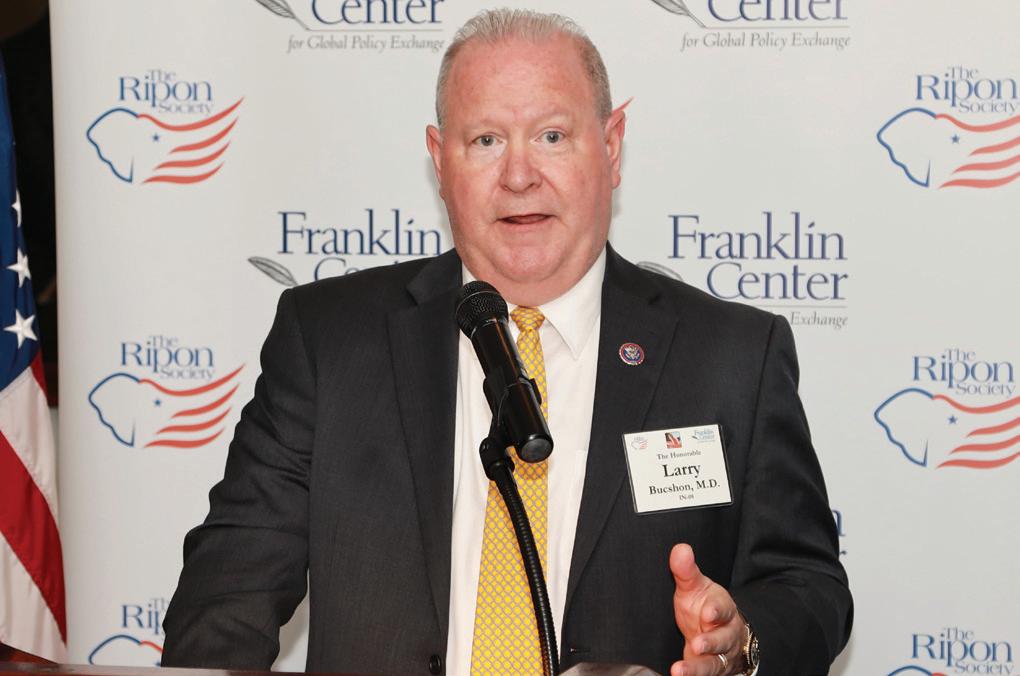

Occupation: U.S. Senator for Alabama
Previous jobs held: President & CEO, Business Council of Alabama; Chief of Staff, U.S. Senator Richard Shelby; Attorney, Butler Snow LLP; Special Assistant to the President, University of Alabama; Press Secretary, U.S. Senator Richard Shelby; Deputy Press Secretary, U.S. Senator Richard Shelby
You’ve been in the Senate for just over six months. What has surprised you most about the job? Having first walked into the Hart Senate Office Building as an intern 20 years ago, it is an incredible honor to now walk these halls as a Senator and have my name on the door. I still have to pinch myself some days – however I’m quickly humbled when I’m still stopped and asked for my staff ID from time to time.
As the youngest Republican woman ever elected to the U.S. Senate, what is one piece of advice for young women across the country considering running for office? We need you to get off the sidelines and into the arena, whether it’s the U.S. Senate or your local schoolboard. Don’t be afraid to make that leap of faith and put yourself out there. When I first got into the Republican primary, I was polling at 2% and my opponent was at 65%. But through hard work and determination, we were able to build an amazing campaign and eventually win 66 of 67 counties in that primary. We won by going old school, visiting every single county, going out to meet farmers and small business owners, taking our message to the people.

What is one problem facing Alabamians that you are working to resolve in the Senate? I ran for the Senate because I wanted to preserve the American Dream for my children and for generations to come. The fact that I’m a product of public schools in Coffee County, Alabama, and now vote on the floor of the U.S. Senate is proof that in this country, it’s not your zip code that matters, but your integrity, your character, your work ethic, and the way you treat people. I’m fighting every day to grow 21st century opportunities for hardworking Americans and defend Alabamians’ values, interests, and liberties.
Finally, what must the GOP do in the Senate to reclaim its majority? The Republican Party is the party of parents and families. When we take our message to the American people, we have to focus on solutions to the crises that every family is facing around their kitchen table right now. The disastrous Biden Administration has made our country weaker and the world more dangerous at every turn. We know they don’t have the right answers. It’s time to put hardworking Americans back in the driver’s seat.
Organon is proud to support the Ripon Society.
At Organon, our goal is to deliver innovation, improve access, and expand choice to help address therapeutic gaps in women’s health and ultimately improve the lives of women globally.
INVESCO IS PROUD TO SUPPORT THE
INVESCO IS PROUD TO SUPPORT THE
As a global investment firm, Invesco is dedicated to creating greater possibilities for our clients.
As a global investment firm, Invesco is dedicated to creating greater possibilities for our clients.